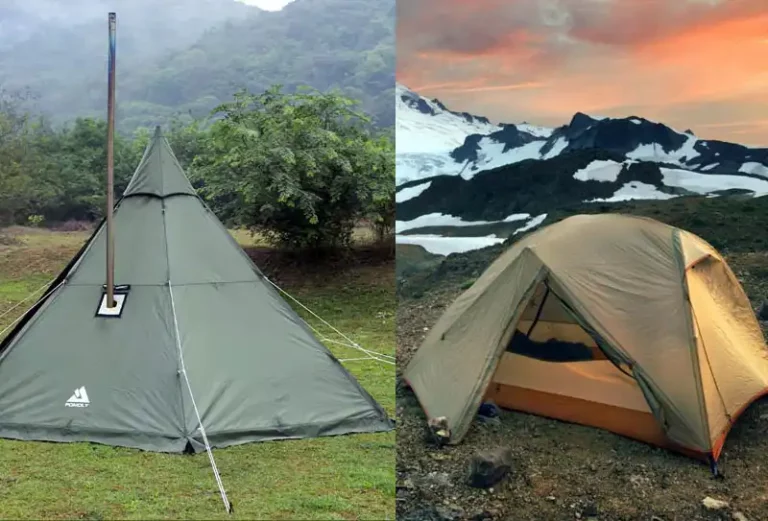When it comes to camping, one of the biggest decisions you’ll have to make is whether to go with a hot tent or a cold tent. Both options have their pros and cons, and the choice you make will largely depend on your personal preferences and needs. In this article, we’ll take a detailed look at both types of tents and help you make an informed decision.
The difference between Hot Tent and Cold Tent
Hot Tents
A hot tent, also known as a heated tent, is a type of tent that is designed to be used with a wood stove or other heating source. The stove is typically located inside the tent, and the heat it generates keeps the interior warm and cozy even in cold weather.
Pros:
- Warmth: The obvious advantage of a hot tent is that it provides warmth in cold weather. This makes it a great option for winter camping or camping in cold climates.
- Comfort: A hot tent provides a comfortable environment for sleeping and hanging out. You don’t have to worry about getting cold or uncomfortable during the night.
- Cooking: With a wood stove inside the tent, you can cook food and boil water without having to leave the warmth of the tent.
Cons:
- Cost: Hot tents can be more expensive than cold tents due to the additional materials and construction needed to accommodate a stove.
- Weight: Hot tents are generally heavier than cold tents due to the stove and additional materials needed to withstand the heat.
- Safety: There is a greater risk of fire with a hot tent due to the use of a wood stove. You need to be careful when using the stove and ensure proper ventilation to avoid carbon monoxide poisoning.
Cold Tents
A cold tent, also known as a traditional tent, is a type of tent that does not have any heating source built-in. It relies on your own body heat and the use of a sleeping bag to keep you warm.
Pros:
- Cost: Cold tents are generally less expensive than hot tents due to the simpler design and construction.
- Weight: Cold tents are generally lighter than hot tents due to the absence of a stove and additional materials.
- Safety: There is no risk of fire with a cold tent.
Cons:
- Cold: The obvious disadvantage of a cold tent is that it can be very cold in colder weather. You need to ensure you have adequate clothing and sleeping gear to stay warm.
- Comfort: A cold tent can be less comfortable than a hot tent, especially if you are not prepared for the cold.
Choosing the Right Tent for You
Now that we’ve covered the pros and cons of hot tents vs. cold tents, let’s talk about how to choose the right one for you.
Consider the Climate
The climate you’ll be camping in is one of the most important factors to consider. If you’ll be camping in colder weather or in a cold climate, a hot tent is probably your best option. If you’ll be camping in milder weather, a cold tent may be sufficient.
Consider the Cost
Hot tents are generally more expensive than cold tents, so you’ll need to consider your budget when making your decision. If you’re on a tight budget, a cold tent may be the better option.
Consider Your Comfort
Finally, consider your personal comfort level. If you’re someone who gets cold easily and wants to be warm and cozy at all times, a hot tent may be the better option. If you’re comfortable with colder temperatures and don’t mind bundling up, a cold tent may be sufficient.
Conclusion
Ultimately, the decision between a hot tent and a cold tent comes down to your personal preferences and needs. By considering the climate, cost, and your personal comfort level, you can make an informed decision that will help you enjoy your camping experience to the fullest.

Anthony is a passionate outdoor enthusiast with a love for adventure and exploring the great outdoors. With years of experience hiking, camping, and rafting, he has a wealth of knowledge to share with others. Anthony’s writing captures the essence of his experiences, offering readers insights into some of the most beautiful and breathtaking landscapes in the world. Follow his journey and join the conversation as he continues to share his passion for the great outdoors.

